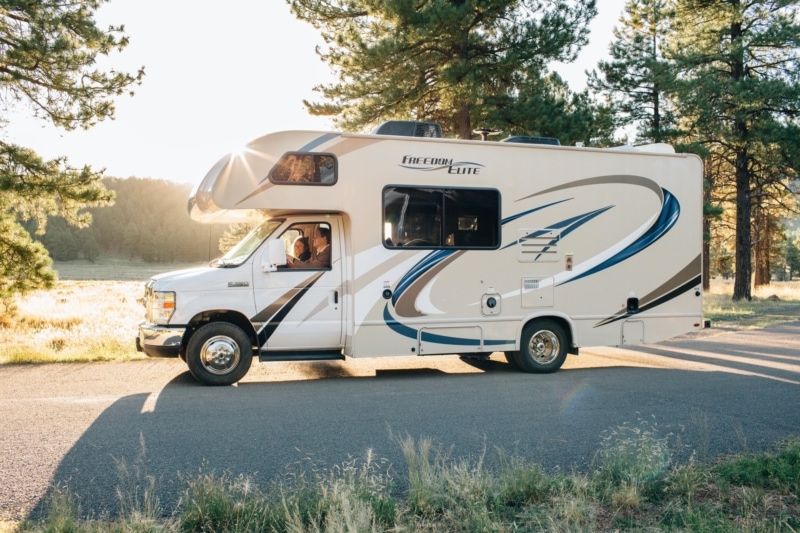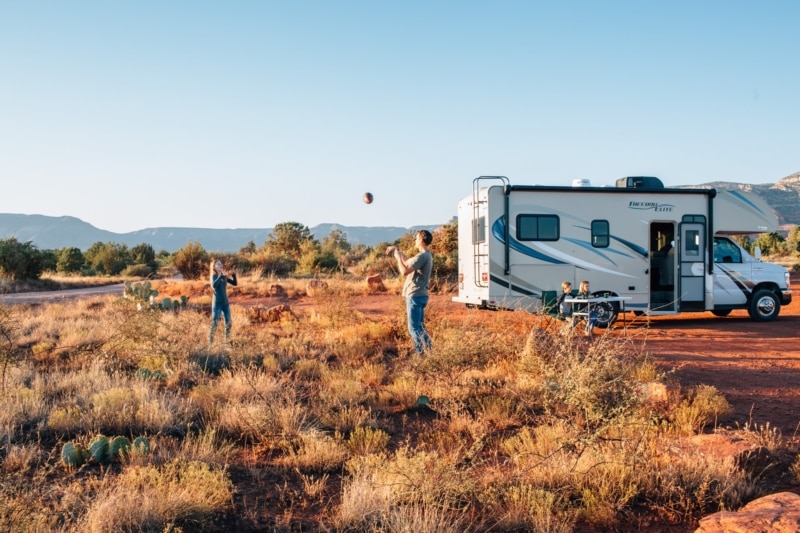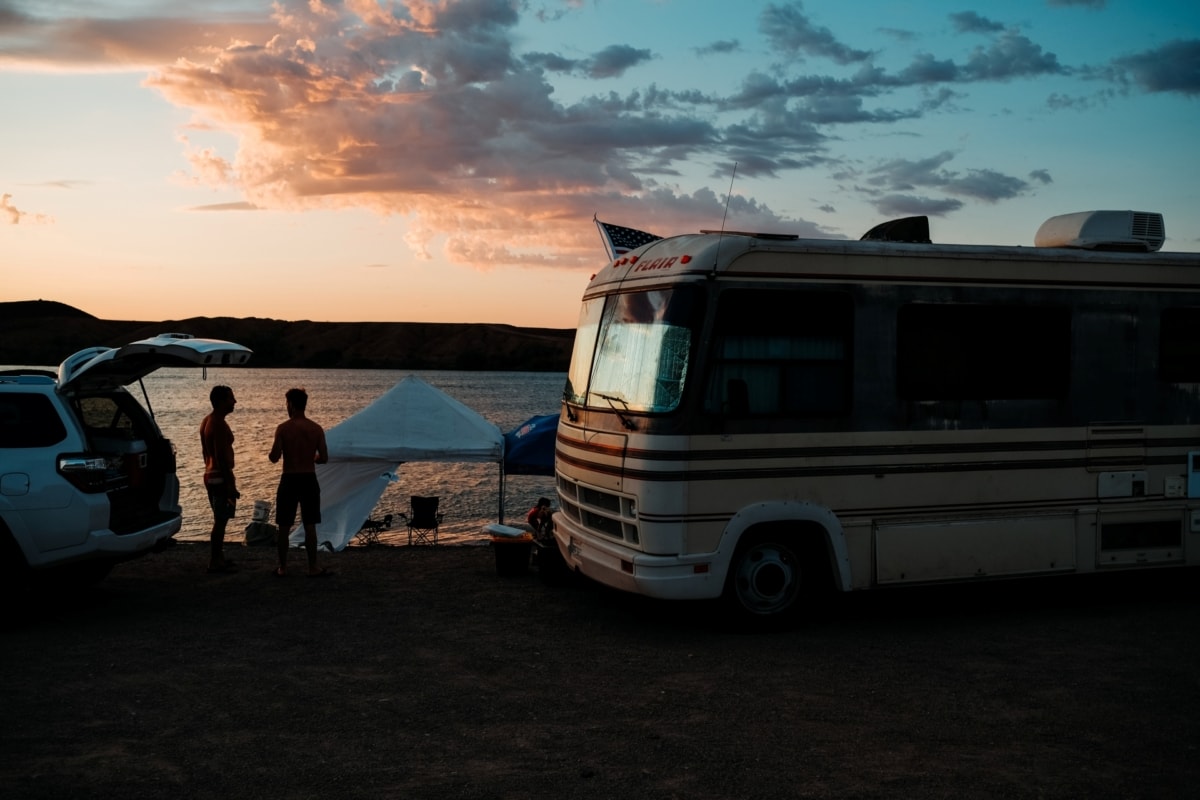As an RV owner, you already know the freedom of the open road. You know what it means to explore the outdoors camping in an immersed and personal manner. You probably also know how expensive it is to keep the thing running!
Should I Rent My RV? Pros and Cons of RV Rental for Owners
“Should I rent my RV?” Almost every van and RV owner has asked themselves this question at one time or another.
Using your camper as an asset can be a great opportunity for RV owners but there is a lot to consider before taking the plunge. While there is surely money to be made, you also have to consider what it requires, such as proper RV insurance coverage, wear and tear, and management.
Before you make a decision, let’s go over all the details. Here’s everything you need to know about renting out your RV so you can make an educated decision on if it’s the right choice for you.
Is Renting Out Your RV Worth It?
In my opinion, it’s a no-brainer: yes, it’s worth it.
Of the large number of people that own an RV, campervan, or travel trailer, only a small percentage are actually traveling full-time in their RVs. If that’s you, and you’re living the vanlife and are using your RV regularly, then renting out your RV might not be for you!
However, if you’re not a full-time vanlifer, chances are that your RV is spending more time in a parking space than on the road.
If your vehicle spends absolutely any time sitting still, you’re missing out on potential money. Even renting out your RV for just a month or two could be enough to cover an entire year’s worth of loan payments, insurance coverage, or maintenance costs.
But like all good things, listing your motorhome has some downfalls. It requires changing your insurance coverage, opens the door for potential damage, and takes time to manage.
How Much Can You Actually Make Renting Out Your RV?
Well, that depends. What kind of RV do you have? Gross revenue from renting your RV can range anywhere from $36,000 up to $70,000 per year.
Chances are you will not rent out your RV all year long. You’ll have slower seasons or want to keep some availability for yourself. With this in mind, I’ll run numbers as though each RV type was rented for 40 weeks out of the year, leaving owners with about three months of their own personal use or downtime.
Let’s break down the financials based on your RV type.
(Please keep in mind that most RV rental sites, including Outdoorsy, have a fee of 15-20% of the total booking pricing. Numbers listed below are based on averages of RV listings from Outdoorsy.com.)
Class A Motorhome
Class A luxury motorhomes are perfect for the RV lifestyle. They are large enough and comfortable enough for travelers of all ages and experience levels. Motorhomes are the perfect RV rental for a family vacation and include enough room for pets if you decide to allow animals in your rental.
- Average cost per night = $200
- $200 x 7 days = $1,400 per week
- Yearly gross revenue = $56,000
Class B Camper Van
A campervan is a wonderful form of travel, as most can fit in nearly any size campground site. They allow for extra freedom through fewer location restrictions, as most can fit into a parallel parking spot in major cities while still enjoying the benefits of handling dirt roads properly. Lastly, they are easy for a first-time renter to handle, providing some ease for nervous RV owners.
- Average cost per night = $250
- $250 x 7 days = $1,750 per week
- Yearly gross revenue = $70,000

Travel Trailer
Travel trailers are a great rental asset because they don’t require engine care like other motorhomes. While they need a vehicle that can tow them properly, it’s extremely appealing to have a secondary unit that can detach and be left at a site while exploring for the day.
- Average cost per night = $100
- $100 x 7 days = $700 per week
- Yearly gross revenue = $28,000
Additional components that will affect your rental revenue:
- How decked out your RV is – think of any house or apartment you’ve rented. The nicer the amenities and layout, the more expensive it is, right? Extra amenities, such as a tow hitch, bike rack, interior heat, and more will allow you to charge more per night for your rental.
- Seasonality and location you’re renting from – peak season (from May to September) is always the busiest. Also, Cities that are located near the outdoors are a hit for camper rentals. Places like Colorado, Utah, and Oregon will have year-round visitors.
- Extra services provided – if you’re willing to offer extra services, you can charge an extra fee. Consider drop-off and pick-up services for your renters to help with their departure and arrival!
- Mileage allowance + overage charges – beyond the allowed mileage per day, owners can allow for extra mileage for a hefty fee. The average mileage overage fee is over $0.30 per mile!
Pros of Renting Out Your RV
Money is the first and most important benefit of renting out your RV. Think passive income, big payouts, with a fairly easy workload. Whether you decide to keep that money or use it toward the expenses of being an RV owner, extra money is good money.
Beyond the additional income, there are numerous benefits to renting out your RV.
Pay Off your RV Faster
Consider your rental an investment! You use your RV or campervan as an asset to fund itself. Paying off your loan faster means you can save money on interest. You’ll have the title in your hands before you know it. It’s really quite genius.
Think about it: by listing your RV for rent and with enough bookings, you can essentially pay nothing for your RV. Bookings can put the money you spent upfront for the motorhome back into your pocket. If you have a loan, you can even use the booking payouts to cover scheduled payments and completely pay the loan off within three years.
Cover your Ongoing Owner Costs
Even if you’re still wanting to travel part-time in your RV or campervan, renting it out on occasion, such as during peak seasons, could pay for a large majority or all of your vehicle expenses.
Your travels, vehicle tune-ups, registration, and insurance all come out of your own pocket. Renting out your van could provide an opportunity to cover these costs and save money, if not earn a profit.
With larger RVs or campers, storage costs a large chunk of change. Instead of paying money to store and protect your RV when you’re not using it, you could be making money renting your RV out.
Avoid Damages from Long-Term Storage
If you live on the road full-time in your RV, chances are you’re able to notice any mishaps or build upkeep necessary. You’re constantly paying attention to every aspect of your RV and can handle things as they come up.
For part-time travelers (who are full-time owners) having your RV or van sit in storage for long periods of time can be problematic. A leak can spring that you don’t catch, which causes water damage. Pests love to settle into stationary vehicles, which runs the risk of chewed wires.
If your RV is parked outside, there are a handful of other risks thrown into the mix. Weather conditions can cause exterior damage over time. Diesel vehicles require extra love in the colder seasons, including running the engine occasionally. With rental bookings and the check-in/check-out process of trips, you’re far more likely to catch any required maintenance and avoid further damage.
Plus, Outdoorsy and other online rental platforms require a 90-day service every 90 days. You’ll be held accountable for scheduled mechanical work and your RV will stay in the best shape possible.
Fund your Dream
If you don’t own a campervan but have an interest in purchasing one, this could be the key to your dream. You can buy a newer van that requires less initial mechanical work and use rental bookings to help with upfront costs. Consider a camper that’s already built out, such as Storyteller Overland.
Another option is to buy an older motorhome that has parts readily available (think Ford, Nissan, etc). For a decent price, you can fix it up, build it out, list it for rent, and use the booking payouts for the build and expected maintenance.
Grow your Travel Community
There are two aspects worth noting here. The first is that you get to expand your community and connect with like-minded people who enjoy road travel and camping. If you own an RV, chances are that you’re passionate about getting on the road and traveling. By renting out your RV, you’ll inevitably meet people who enjoy the same things. Who knows – you may just find your next camping or caravan buddy.
The second thing worth noting is that you have an opportunity to share your passion for road travel with others who may have never experienced it before. By gifting the unique adventure of travel and introducing the RV lifestyle to others, you’re able to spread the love of the RV community and continue to help it flourish.

Cons of Renting Out Your RV
While there are many benefits to renting out your RV, it’s only fair that I also cover the drawbacks. These are the major pitfalls worth noting if you decide to take on booking requests. Below are the major cons to consider when weighing out whether to rent your campervan or not.
Damages from Rentals
One of the most obvious pitfalls of renting out your RV as an owner is potential damage to your vehicle. Smaller dents and scratches will require money to fix but are very manageable. The bigger issues come into play when larger parts of rented RVs have to be replaced.
The best way to counteract this is to have sufficient insurance and require a security deposit upfront. Having a thorough walk-through process with your renters also helps. Plus, most rental platforms require a driving record check before approving a potential renter, which is super helpful.
Regular Wear and Tear
Aside from actual damages that may occur during a rental, such as a car accident, exterior scratches, and dents, it’s also important to think about the amount of usage that will occur during bookings. Using different items in your van build more frequently may require more upkeep, care, and possibly replacement. Here are some of the main things to look out for:
- Extra mileage on your engine
- Mechanical maintenance every 90 days
- Tire tread wear down
- Windshield rock chips
- Electrical system battery life
- Increased propane canister refills
- Scratches on floors, cabinets, and walls
- Broken drawer slides and latches
- Exterior scratches from low hanging tree branches
- Extra damage if pets are allowed
Using too Much of Your Time and Energy!
The amount of time, energy, and stress it takes to rent out your RV is also something to be considered. Managing communication with renters, cleaning in between bookings, and just generally being worried about your perfect RV can be a lot.
Think about renting out your RV as a side business. Make sure you leave enough time in your schedule to dedicate to the job. Stay on top of everything required to rent out your camper, so you don’t get behind or overwhelmed. Plus, the many benefits you’ll receive will likely be worth it.
Is RV Rental a Good Investment?
Not convinced posting your RV for rent is worth it? It’s also a great investment option with a lower barrier to entry than renovating homes for vacation rentals. Instead of having to invest upwards of multiple hundreds of thousands of dollars, you can invest anywhere from $20,000 to $80,000 and still make great money.
Consider purchasing an RV and immediately renting it out, similar to a vacation home. You can use your earnings to make your monthly payment or even pay more than your monthly minimum as you rent it out. Within three years you could own your RV outright, essentially buying yourself a free RV. If you’re not interested in putting it in storage or using it yourself, you can either continue making money renting it or sell it for a cash lump sum.
Even if you’re not interested in the RV lifestyle yourself, you can always approach renting out an RV as a business. Having multiple streams of revenue is extremely smart, especially if one of them creates passive income.
If you have an RV that isn’t currently being used full-time, I highly recommend listing it for rent. Whether you have a class A, class B, or a travel trailer, there are individuals interested in experiencing a road trip and your vehicle can provide that opportunity. Weigh out the pros and cons for yourself but hopefully, you’ll seize the opportunity and reap some nice benefits.
-
Is it profitable to rent out your RV?
Yes, renting out your RV can be very profitable, especially if it is a highly in-demand type.
-
Can you make money on Outdoorsy?
Yes, by renting out your RV on Outdoorsy, you can make a great side income.
-
Can you put an RV on Airbnb?
Yes, you can put an RV on Airbnb. Usually, Airbnb RV rentals will be stationary, meaning you need somewhere to park it where people can stay in it.
-
Are RVs worth it?
RV’s are a fantastic way to travel around the country, and you can make it worth it by renting out your RV when you aren’t using it.
-
Is owning an RV cheaper than a house?
Yes, RV living can be far less expensive than owning a house.

